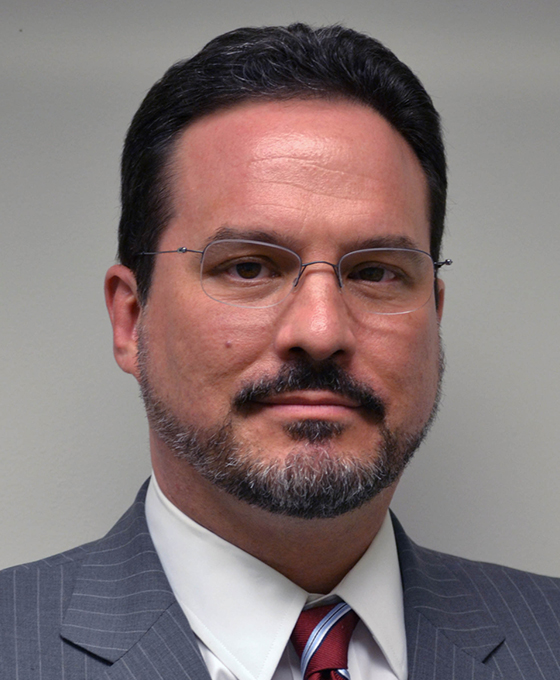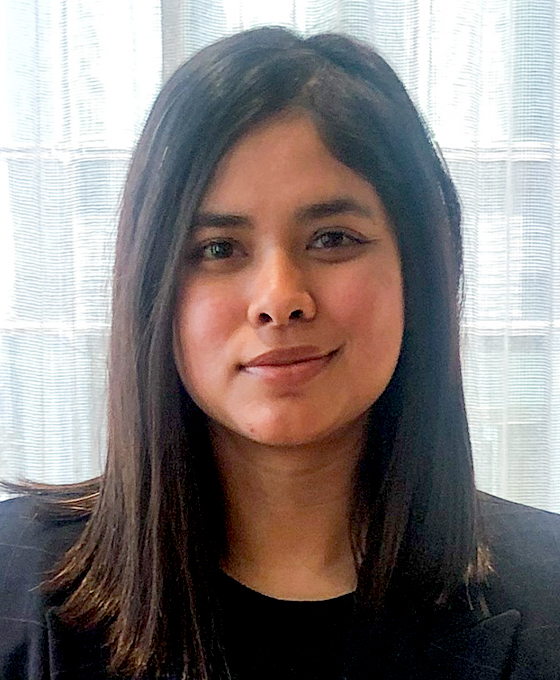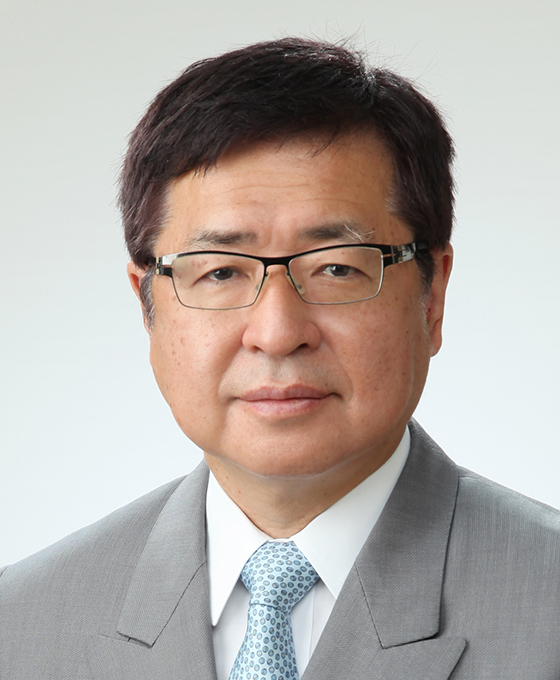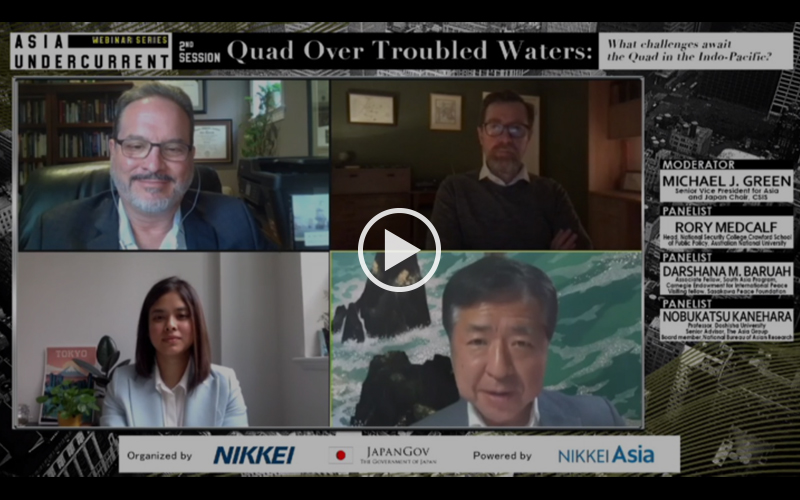ARCHIVES
WEBINAR SERIES 2
QUAD OVER TROUBLED WATERS
What challenges await the Quad in the Indo-Pacific?
Our moderator and panelists provided expert insights and analyses on various topics surrounding the Quad, its geopolitical challenges and future potential. To view the full video (90 min.), click the thumbnail below.
MODERATOR
Senior Vice President for Asia and Japan Chair, CSIS
PANELISTS
Head, National Security College, Crawford School of Public Policy, Australian National University
Associate Fellow, South Asia Program, Carnegie Endowment for International Peace
Visiting fellow, Sasakawa Peace Foundation
Professor of Doshisha University in Kyoto and the former Deputy Secretary-General of the National Security Secretariat under the Abe administration.
MICHAEL J. GREENSenior Vice President for Asia and Japan Chair, CSIS

Michael Jonathan Green is senior vice president for Asia and Japan Chair at the Center for Strategic and International Studies (CSIS) and director of Asian Studies at the Edmund A. Walsh School of Foreign Service at Georgetown University. He served on the staff of the National Security Council (NSC) from 2001 through 2005, first as director for Asian affairs with responsibility for Japan, Korea, Australia, and New Zealand, and then as special assistant to the president for national security affairs and senior director for Asia, with responsibility for East Asia and South Asia. Before joining the NSC staff, he was a senior fellow for East Asian security at the Council on Foreign Relations, director of the Edwin O. Reischauer Center and the Foreign Policy Institute and assistant professor at the School of Advanced International Studies (SAIS) at Johns Hopkins University, research staff member at the Institute for Defense Analyses, and senior adviser on Asia in the Office of the Secretary of Defense. He also worked in Japan on the staff of a member of the National Diet.
Dr. Green is also a nonresident fellow at the Lowy Institute in Sydney, Australia, a distinguished scholar at the Asia Pacific Institute in Tokyo, and professor by special appointment at Sophia University in Tokyo. He is a member of the Council on Foreign Relations, the Aspen Strategy Group, the America Australia Leadership Dialogue, the advisory boards of Radio Free Asia and the Center for a New American Security, and the editorial boards of the Washington Quarterly and the Journal of Unification Studies in Korea. He also serves as a trustee at the Asia Foundation, senior adviser at the Asia Group, and associate of the U.S. Intelligence Community. Dr. Green has authored numerous books and articles on East Asian security, including most recently, By More Than Providence: Grand Strategy and American Power in the Asia Pacific Since 1783 (Columbia University Press, 2017). He received his master’s and doctoral degrees from SAIS and did additional graduate and postgraduate research at Tokyo University and the Massachusetts Institute of Technology. He received his bachelor’s degree in history from Kenyon College with highest honors. He holds a black belt in Iaido (sword) and has won international prizes on the great highland bagpipe.
RORY MEDCALFHead, National Security College, Crawford School of Public Policy, Australian National University

Rory Medcalf is Head of the National Security College at the Australian National University. His career spans diplomacy, intelligence analysis, think tanks, academia and journalism, including as founding director of the security program at the Lowy Institute.
In government, Professor Medcalf was a senior strategic analyst with the Office of National Assessments, Australia’s peak intelligence agency, and a diplomat with service in India, Japan and Papua New Guinea. He now plays a lead role in informal diplomacy among a range of Indo-Pacific powers. He has contributed to three landmark international reports on nuclear arms control and was an adviser for Australia’s 2016 Defence White Paper.
Professor Medcalf is recognised globally as a thought leader on the Indo-Pacific strategic concept, as articulated in his acclaimed 2020 book Contest for the Indo-Pacific (published internationally as Indo-Pacific Empire). He is a member of the ASEAN Regional Forum Register of Experts and Eminent Persons, the board of the National Foundation for Australia-China Relations, and the Scientific Advisory Council of the Finnish Institute of International Affairs.
DARSHANA M. BARUAHAssociate Fellow, South Asia Program, Carnegie Endowment for International Peace
Visiting fellow, Sasakawa Peace Foundation

Darshana M. Baruah is an associate fellow with the South Asia Program at the Carnegie Endowment for International Peace where she leads the Indian Ocean Initiative. Baruah is also currently a visiting fellow at the Sasakawa Peace Foundation, Tokyo, where she is working on a book about the significance of strategic islands in the Indian Ocean region. Her primary research focuses on maritime security in Asia and the role of the Indian Navy in a new security architecture. Her work also examines the strategic implications of China’s infrastructure and connectivity projects as well as trilateral partnerships in the Indo-Pacific.
Previously, Baruah was the associate director and a senior research analyst at Carnegie India where she led the center’s initiative on maritime security. As the associate director, Baruah’s institutional responsibilities included coordinating and overseeing the center’s development, outreach, and institutional partnerships. While at Carnegie India, Baruah also coordinated and led various track 1.5 dialogues and seminars. Her research projects included work on the Andaman and Nicobar Islands as well as trilateral partnerships and strategic connectivity projects in the Indo-Pacific.
In 2018, Baruah was also a visiting fellow at the Japan Institute of International Affairs (JIIA) Tokyo. Prior to this, Baruah was a 2016 national parliamentary fellow at the Australian parliament and a visiting fellow at the Australian National University (Canberra) and the Lowy Institute (Sydney), where her research was centered on India-Australia maritime collaboration in the Indo-Pacific.
Baruah was awarded the programme d’invitations de personnalités d’avenir (broadly translates to “personalities of the future”) by the French Ministry of Foreign Affairs in 2018 and was also named as the UK’s next generation foreign and security policy scholar for 2017.
Prior to Carnegie India, Baruah was with the maritime security initiative at the Observer Research Foundation, where she was the associate editor of the South China Sea Monitor.
NOBUKATSU KANEHARAProfessor, Doshisha University
Senior Advisor, The Asia Group
Board member, National Bureau of Asian Research

Nobukatsu Kanehara is professor of Doshisha University, Kyoto, a senior advisor to The Asia Group and a board member of National Bureau of Asian Research. Mr. Kanehara draws on substantial experience serving at the highest levels in the Government of Japan, where he was recognized as a leading diplomat and strategic voice on international affairs, and offers nuanced insights into Japanese national security priorities, as well as domestic political and policy dynamics.
Most recently, Mr. Kanehara served as Assistant Chief Cabinet Secretary to Prime Minister Shinzo Abe from 2012 to 2019. In 2013, Mr. Kanehara also became the inaugural Deputy Secretary-General of the National Security Secretariat, a role which he held until his retirement from government service in 2019. He also served as Deputy Director of the Cabinet Intelligence and Research Office.
Mr. Kanehara’s role in the Cabinet built on a distinguished career at the Ministry of Foreign Affairs, where he served in a number of notable positions. These included the Director-General of Bureau of International Law, Deputy Director-General of the Foreign Policy Bureau, Ambassador in charge of the United Nations and Human Rights, Deputy Director-General of European Affairs in charge of Russia and Eastern Europe, Director of the Ministry’s Policy Coordination Division, the Japan-U.S. Security Treaty Division. He served abroad as Deputy Chief of Mission in Seoul, Republic of Korea, Minister at the Embassy of Japan in Washington, the United States and Minister of the Permanent Mission of Japan to the United Nations.
Born in Yamaguchi Prefecture, Mr. Kanehara entered the Ministry of Foreign Affairs following his graduation from the University of Tokyo’s Faculty of Law in 1981. Early during his career at the Ministry, he studied at the École Nationale d’Administration in France. He is the author of Senryaku Gaiko Genron: A Grand Strategy of Japan for the 21st Century (2011, Nihon-keizai-shinbumsha). He contributed an article titled “The power of Japan and it’s grand strategy” to Japan’s World Power edited by Professor Guibourg Delamotte (2019, Routledge). He currently teaches at Doshisha University’s Faculty of Law as professor and has previously taught at the Faculty of Law and the Graduate School of Law at Waseda University. He is proficient in French, as well as Japanese and English. He was decorated by the president of Republic of France with Ordre de la Legion d’Honneur.

